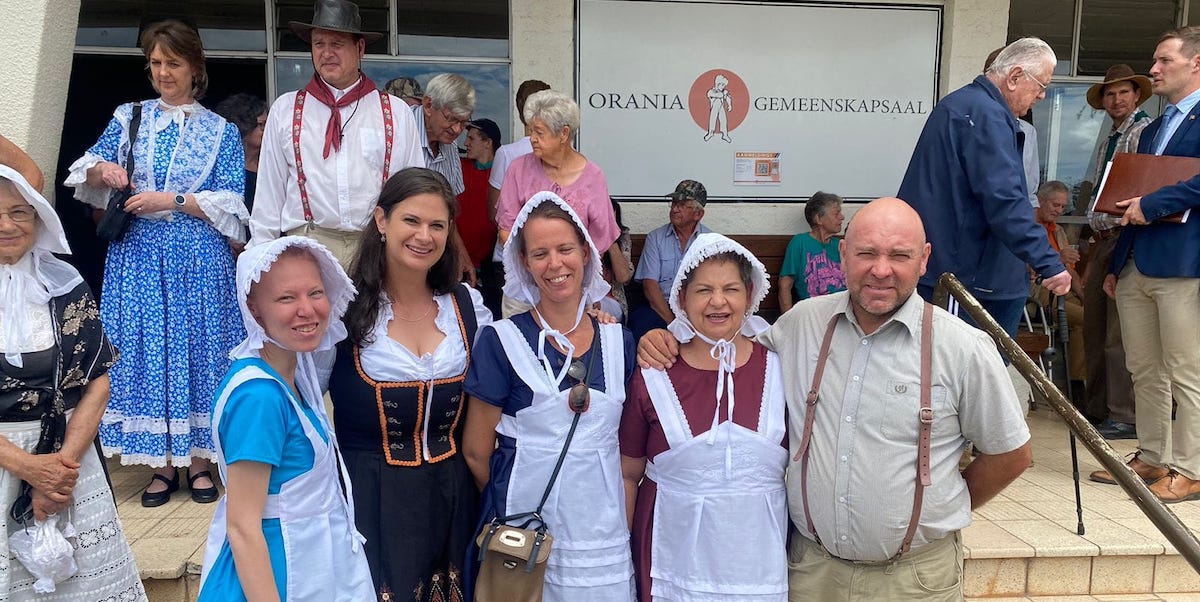In South Africa – the African state in which from 1948 to 1991 a group of heirs of white colonizers implemented apartheid, the policy of racial segregation of blacks – there is still today a small town where only white people live and where in fact the black people are not allowed. The city is called Orania and was founded in 1991the year in which apartheid ended, by some Afrikaners, an ethnic group made up of descendants of white European settlers, mostly Dutch: the Afrikaners were among the main responsible for the implementation of the racial segregation regime of blacks, and the founders of Orania claim to have the precise objective of preserving their culture.
Over the years Orania has received praise from right-wing or far-right political figures, in some cases being taken as inspiration model by white supremacist groups abroad. In South Africa it is considered a kind of symbol of how racial divisions and forms of segregation are far from over.
Orania is located more or less in the center of South Africa, in the Northern Cape Province and in the semi-desert region of the Karoo. It is a tiny city, less than 9 square kilometers in area and with around 3,000 inhabitants. The last one census available, from 2011, says that 97 percent of the population is white and that 98 percent speak Afrikaans, the Dutch-origin language spoken by Afrikaners.
Orania also has its own flag, with a little boy rolling up his sleeves against a blue and orange background. Are the colors which carried the South African flag until 1994, the year in which free and open elections were held for the first time in the country’s history, in which Nelson Mandela was elected as President of South Africa, and in which South Africa adopted its current flag.
Over time Orania has also acquired its own currency, “l’ora”, whose value is the same of South Africa’s official currency, the rand. There are shops, hairdressers, a library, a post office, a hotel, a couple of Christian schools and many churches, all Christian.
The flag of Orania (from Wikipedia)
Orania was founded thanks to a group of Afrikaner families, which included the daughter and son-in-law of Hendrik Frensch Verwoerd, Prime Minister of South Africa from 1958 to 1966 and often referred to as “the architect of apartheid”. Anna Verwoerd and Carel Boshoff bought fertile land on the banks of the Orange River that the Department for South Africa’s water affairs had first identified to build a water infrastructure and then put up for sale in 1989.
For some time Boshoff and other Afrikaners had been looking for a place to establish a vall statea “people’s state”, a term widely used by some Afrikaner nationalists after the end of apartheid to call for the creation of independent territories within South Africa.
The area purchased by Boshoff and the others was not uninhabited: about 500 people lived there, almost all black and poor, who had set up their homes in abandoned buildings, in some cases illegally.
British historian Edward Canavagh has reconstructed the story which led to the clearing out of those buildings, which were talked about a lot in the local press. Boshoff publicly complained that he had bought a piece of land he believed was uninhabited and which instead had turned out to be a “bus full of passengers”, and the operations lasted several months. Some people left voluntarily, others were forcibly removed.
The practice that still regulates life inside it also dates back to the time of Orania’s foundation. Concretely Orania works as a kind of company: its territory is a private property of Vluytjeskraal Share block, a company founded in 1990, and whoever wants to go and live there must buy shares, effectively becoming co-owners. Among the internal governing bodies is the Representative Council of Oraniawhose members are democratically elected: in the last elections, in 2021, there were 12 seats in the Council.
ORANIA VOTE ITSELF: IN OUR OWN ELECTION
Oranians today vote for 11 +1 (out of 21 nominated) candidates who will represent them in Orania’s version of its own unique municipal order. No political parties, only representatives! pic.twitter.com/pzeOrQAFym
— Joost Strydom (@StrydomJoost) November 1, 2021
Over the years the formal status of this city has been challenged on several occasions by the Provincial Government of the Northern Cape, which in 2000 announcement of wanting to abolish the autonomous governing bodies of Orania to merge it with a neighboring city. The inhabitants of Orania objected, relying on an article of the South African constitution approved in 1996 which essentially allows communities that share a language and a culture to self-determination also territorially within South Africa.
Orania won the case in 2000: the Supreme Court he settled that its governing bodies were not to be abolished. No appeals have yet been presented against that sentence, even though the provincial government returned to the issue four years ago: Zamani Saul, head of government, said that Orania was a racist enclave and announced the start of some investigations to verify whether it really had the legal basis to exist (there has been no update).
To become citizens of Orania you must pass a very strict selection and demonstrate that you possess a series of requirements, including knowledge of the Afrikaans language and culture, being of Christian faith and the willingness to adhere to a rather conservative system of values: unmarried couples, for example, they cannot coexist.
The exclusion of black people is a kind of unwritten rule: theoretically anyone can go and live in Orania, as long as they demonstrate a thorough knowledge of the Afrikaans language and culture and are committed to preserving it, but in practice this is not the case. The Guardian he recounted for example of the prohibition for blacks to use a gas station on a street in Orania: Benjamin Khumalo, a 55-year-old black man who lives nearby, said that one evening when he was on his way home and he stopped there to get gas he had been attacked by a group of white men who had approached him with a pickup covered in Orania stickers.
The exclusion of blacks from Orania was told by Carel Boshoff IV himself, son of the Boshoff founder of Orania and president of the Orania Movement, the political association of Afrikaners of which the families who founded it were members and which still exists today. Interviewed by scholars e journalists who have taken an interest in the issue over time, Boshoff has made it clear on several occasions, with beating around the bush and without ever saying it explicitly, that coexistence between blacks and whites is impossible in Orania.
A CNN Boshoff said, for example, that it is not impossible for blacks to live in Orania, but it is “very difficult”, because “they would be noticed” and this would lead to inevitable “practical difficulties” which in fact “would not make relations easy” with whites. To Africanewsnews site by Euronews dealing with Africa, Boshoff he said that although Orania is theoretically open to everyone, “there have not been many requests to live there” from black people.
The residents of Orania have been accused on several occasions of being a racist and nostalgic group of apartheid times, which they continue to deny, claiming that they decided to live in Orania because it is a safe place, away from degradation, poverty , by the widespread violence and political failings they believe characterize so many cities in South Africa. Others they argue that they went to live there simply because they found a job there, but not to teach their children that black people should be discriminated against.
In other cases the inhabitants of Orania they boast of having eliminated the traditional inequalities between whites and blacks in the world of work, whereby black people do the humblest and least paid jobs and white people the most prestigious and profitable ones: in Orania even the humblest workforce is white and, like written in a del report Guardian, “there is not a single brick that has been laid by a black worker.”
In other cases, the inhabitants of Orania say openly racist things: a BBC one of the residents he said that “he sees nothing wrong with apartheid”. To the Guardian another said Orania is like “a Disneyland for boers [i discendenti dei coloni bianchi che nell’Ottocento, durante la colonizzazione, crearono alcuni stati indipendenti all’interno del Sudafrica]except that you must never go home.’
– Read also: The white mayor making his mark in South Africa
Over the years Orania has been lauded on multiple occasions by right-wing politicians and white supremacist groups. Among others Willem Petzer, South African activist who claims to fight against the “genocide of whites” in South Africa, he described this place as the only safe haven from the hate against white and Christian people spread across South Africa. Petzer also has Done a documentary on the history of Orania, filmed and distributed by Ernst Roets, the CEO of AfriForum, an NGO that presents itself as an organization that deals with civil rights but which is considered by many to be a racist and far-right organization.
Orania has also been explicitly cited as an inspirational model by Lads Societyan Australian far-right white supremacist group with explicitly neo-Nazi positions, whose members have said they want to recreate something similar in Australia too, with suburbs inhabited only by people «Anglo-European».
According to several people Orania should cease to exist: in addition to Zamani Saul, head of the provincial government of the Northern Cape, the South African lawyer and activist Tembeka Ngcukaitobi is of this opinion, according to which Orania is incompatible with the institutions of a country that claims to have ended apartheid.
In the meantime, however, Orania continues to expand: in the last seven years its population has doubled and it is continuing to grow about 10 percent each year. Population growth is leading to the construction of new blocks of flats, sold roughly the same price as those in Johannesburg, the capital. Even the economy seems to gradually strengthen: the unemployment rate is equal to 2 percent, and Orania sells its products, especially the pecan nightsboth in South Africa and abroad.


